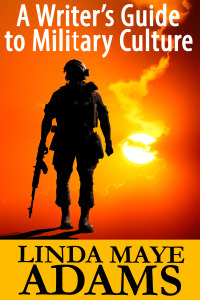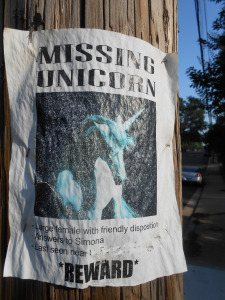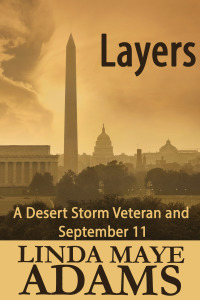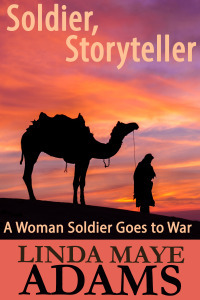Linda Maye Adams's Blog, page 96
July 6, 2015
The Soldier Conversation is Missing the Women
There was a photo that went viral over the last few days, identified as disabled women soldiers. It turned out to be models. There was some angry “How dare this happen?” on the veteran Facebook pages.
I think the reason people got excited over it is that there is so little of anything about women veterans. The press makes women out to be victims because that sells stories, and then focuses on the men for everything else. The official military sites don’t post many photos of women. I just went on the Army website, searched through eight pages of photos (20 each page), and there were only four of women soldiers.
It’s particularly bad because they have more pictures of Afghan women, celebrities, and even children. Yet, they default straight back to the male soldiers.
So I’m sharing one of the four pictures from the Army site.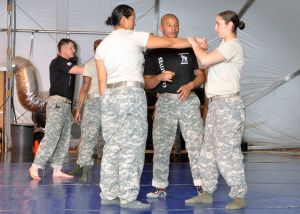
Staff Sgt. Kevin Wright, center, unarmed self-defense instructor, explains an unarmed self-defense technique to 1st Lt. Sovannchampa Touch, left, and 1st Lt. Erin Kan, members of the 724th Military Police Battalion. Unarmed Self Defense is required training for units preparing to conduct Detainee Operations in support of Overseas Contingency Operations. Division West, First United States Army has the responsibility for training all deploying National Guard and Reserve Units conducting Detainee Operations. U.S. Army Photo by CPT John Brimley.
My comments: When I was in, we didn’t do anything like the this. The closest was in basic training. We used pugo sticks, which look like giant cotton swabs. As a joke, the drill sergeants paired the two least likely to be soldiers (me and another woman). We put on helmets and hit each other with pugo sticks. Times have changed!
Filed under: Military Tagged: disabled women soldiers, the Army, Women Soldiers, Women Veterans








July 5, 2015
Culling the eBook Herd
My Nook was giving me the evil eye—it was full! How’d that happen?
Well, yeah, we know how that happened. Books, and more books, and magazines.
So I’ve had to spend some time archiving my collection of eBooks. It was a curious thing going through it—there were a lot of them that I didn’t even remember. Those were probably the free books I got early on. I was just trying to get everything I could.
But if something is free like that, there tends to be not a good reason.
Of course, some of the paid books bit the dust, too. I have one that looked interesting, bought it for pre-release, and when I got it, I couldn’t make sense of the story. Very strange to find that.
Another was a book based on an enthusiastic recommendation of a Facebook friend (she just posted it to her wall, and I happened to see it, so no spamming involved). It was an urban fantasy. But when I got it, the book didn’t survive the first chapter. No setting, beyond mentioning that characters were in a mine.
I was surprised at how much that bothered me, considering I’ve been doing the same thing in my stories until about three or four years ago.
Then we have the magazines. I was subscribing to Writer’s Digest, The Writer, Poets and Writers, National Geographic, Shop Smart, Alfred Hitchcock, Ellery Queen, Analog, and Asimov’s. Surprisingly, everything up through Shop Smart were quite huge.
So I started thinking about what I needed.
Poets and Writers tends to focus on getting an MFA, which is just about teaching writing not doing it professionally. It had interesting interviews with writers, but it really wasn’t doing anything for me. I wasn’t learning anything new from it.
The same thing for Writer’s Digest. It seems to be focused more on beginners starting their first novel and doesn’t have much beyond that. I wasn’t learning anything new from it.
The Writer I opted to stick with, though I’m still thinking about it. They seem focused on a broader range of writers. Besides, I’m partial to them anyway. I remember seeing them on my uncle’s coffee table. Isn’t it awesome to have an uncle with writing magazines on the coffee table?
National Geographic was a test run. I was thinking that reading it might help with stories, but it ended up not working out that way. So zap, that one’s gone.
I was learning new stuff all the time from Shop Smart, so that stayed, and I like the fiction ones. Short stories are fun to read.
I was surprised I had that many subscriptions though. The only paper magazine I get is Entertainment Weekly (I’m a charter subscriber). Once in a while I’d get Real Simple, but they start sending me renewals the first month of the subscription and keep sending them until I give up in frustration and let the subscription die.
Of course, now with all that room, it’s time to hunt for more books …
Filed under: Books Tagged: ebooks, reading








June 30, 2015
Writer’s Guide to Military Culture
Former soldier and Desert Storm veteran Linda Maye Adams walks you step-by-step to help the civilian fiction writer understand how military culture works. From enlistment to war, this book takes you on a tour of what it’s like to be a soldier. Do soldiers curse non-stop? Do they always yell, “Yes, Drill Sergeant!” after every sentence? What is the difference between an officer and an enlisted soldier? If you don’t know anything about the military, this book will tell you where you can research information without having to go through basic training yourself.
Filed under: Military, Writing Tagged: enlisted soldier, Military Culture, writing fiction








June 29, 2015
Daily Life in the Military: Weekends
Contrary to what you hear on TV and in books, we did not need a pass go leave the post for the weekend. Once we were off Friday, we were hopefully off for the weekend.
That wasn’t always true for me, unfortunately. Sometimes the other platoons would pull their person from CQ duty on Saturday, and this guy’s not complaining. He’s out of the 24-hour duty, works a couple of hours, and then he’s off. But the line platoons would say “We don’t have any more people. Get someone from Headquarters Platoon.” Since I was the only one in the barracks from my platoon, I learned very quickly not to answer knocks to my door or to get out of the barracks.
I would often go to the library (it wasn’t like any of the soldiers were going to find me there!). Fort Lewis had a pretty decent library, though the hours were always getting cut. The library always had this book out that listed all the banned books, so I could pick up one of those if I want.
I also could go to the community center. It had chairs for hanging around, TVs, and phones in private rooms that we could call out on for a certain amount of money. In those days, we didn’t have cell phones and there weren’t any phones in the barracks, so this was what was available to us.
Fort Lewis also had an auto shop of sorts where soldiers could go work on their cars. There were also some movie theaters as well.
Eating
Food on the weekend was tough for the barracks soldiers. The dining facilities didn’t get much headcount then, mainly because the soldiers were trying to get away from being sucked up in additional duty. The result was that our Group decided to have the mess halls open on a rotating basis. There were two problems with it. Sometimes the Mess Halls were pretty far away, which was a problem if you didn’t have a car. Fort Lewis did have a shuttle of sorts, but it was so unreliable because a lot of the times the drivers would pull off somewhere and go to sleep.
The second problem was that no one seemed to care enough to tell us what Mess Hall was actually open. A lot of time I’d have to go hunting around and hit two or three buildings, so Burger King on main post became a much better option.
The food also tended to not be very good. One four-day weekend I ate in the Mess Hall all four days. They served the same food for the four days. Not the same menu item–we got the dried out leftovers.
For a little while, a couple of us got smart and headed over to the McChord Air Force Base Mess Hall, which was like eating in a restaurant. The food was better, and the place had nice tables and carpet. But then the Air Force got wise and put their mess hall off limits to Army unless we were up there for appointments, which we would have to show proof of.
So the post Burger King became a staple for many soldiers.
Then there was Domino’s. We had one right off the post, so they got a lot of orders on the weekend. To help generate more orders, they send over one of the drivers with a bunch of boxes of cheap pizza with coupons taped to the top of the box to get you buy more. The driver would come through the barracks with their boxes, hollering, “Pizza!”
Shopping
Most of my shopping ended up being on the weekends. Because I lived in the barracks, I didn’t have to buy groceries at the Commissary. I sometimes thought about buying Diet Coke there, but the hours were very strange. It wasn’t like a normal store, where the hours are the same every day and maybe some variance on the weekends. They were different every single day.
And crowded. It looked like the lines at Costco, except there was one long one filtering into all the cashiers. No “10 items of less” for someone like me with a few twelve packs. I’m sure it had great prices, but the time wasn’t worth spending for me. I bought my sodas at a Target and just watched for sales.
Sometimes I’d go up to the Post Exchange, which we called the PX. The building was new to Fort Lewis, having just opened about the time I arrived. In terms of what they sold, it was kind of like a Target. It had clothes, and magazines, and just a lot of different stuff.
But not cheap. In many cases, if I waited for sales off post, I could do a lot better.
Clothing Sales was also sometimes a weekend stop off. That’s where we bought new uniforms. The Army gave us an initial issued uniform, but after that, we received a clothing allowance on the anniversary of our first enlistment, and used that to buy uniforms and boots that wore out.
It was a store made for men, so all the uniforms were just folded up on shelves like the way you buy men’s clothing. You had to know your size; there wasn’t any place to try things on.
Calls Home
This was in the days before cell phones. I’m sure every soldier now has a cell phone. Then, we didn’t have a phone in the barracks. There was a phone in the main company area, but that was for company use. You couldn’t go down there and use it to call home. A lot of guys had their girlfriends call it though and leave messages. If you got the messages or not depended on who manned the phone that day. Sometimes I’d come out in the evening and find one of the guys practically melting over the phone, talking to his girlfriend.
Mostly though, we made our outgoing phone calls on the payphone outside the barracks. We bought time on AT&T calling cards, and the code could be punched in to dial home. The only problem with all of this is that no one could really call us. We always had to initiate the calls.
Laundry
Doing the laundry was like apartment laundry. We had two washing machines and dryers, but no coin charge. First come, first serve. You had to sit and watch your laundry in the women’s barracks. Sometimes some of the other women would come back and pull your wet clothes out and stick theirs in.
Nights
Nights over the weekend were often bad because some of the soldiers like to play their music really loud. Usually they were also the ones who would take great offense if you asked them to turn it down, so all I could do was suffer in silence.
Of course, it always seemed like the weekend was too short, and then it was back to work!
Filed under: Food, Military Tagged: Fort Lewis, Library, Mess Hall, Shopping, Washington








June 25, 2015
Snuffled by a Dragon and Other Summer Activities
So far, most of my summer has been marked by the high humidity of Washington, DC, and the accompanying thunderstorms. It’s like the air gets so full of humidity that it has to pour rain. We had a monster thunderstorm come through on the heels of Hurricane Bill and there was something like ten tornado warnings all around. One actually touched down in Triangle.
Summer has always represented fun and adventure for me because the weather’s so good. At least aside from the thunderstorms, but frankly, it’s not fun to go to a Civil War demonstration when the wind chill is in the single digits.
One of my first trips was to the Dulles Smithsonian Air and Space Museum. That’s an awesome place! I did a fair amount of walking because it houses planes and jets. One of the surprises was the SR-70, the Blackbird. That was a spy plane the U.S. used for a long time, but has since been retired.
But it wasn’t the first time I’d seen it.
The last time was in the 1970s, also in the summer time. My father worked at Lockheed then, and they held an organization day in Palm Springs, California. The Blackbird was on display for us to look at. I remember there was an armed guard standing in front of it, arms folded across is chest, to make sure no one else got near it.
I also remember thinking that the plane we’d heard about in the news seemed kind of small. Then I got to the Air and Space Museum, and it’s this gigantic, magnificent plane. I don’t know – maybe the one I saw was a smaller model.
After that, it was the space shuttle Columbia. I’ve seen the Endeavor in Los Angeles. There they allowed you to actually walk under it. Air and Space did not allow that. The Columbia itself was “used” – you know how film always makes spaceships like look the future is clean and perfect. I could see the impact of traveling through space had on the tiles.
Then there’s the dragon of the aforementioned title.
We had family day at work. It had the usual stuff for kids, bouncy things, water slides, pony rides, and paddle boats. Gigantor turtle (a foot long turtle) made a brief appearance, then leisurely dove back into the pond. A few of the other surfaced, but most stayed away from all these people.
We had a number of demonstrations, including dances from Mexicans and Indians, as well as a Chinese Dragon. The dragon consisted of two men wearing the dragon costume. The costume was red, probably nylon, with rows of nylon hair, and bells.
The men were pretty good. Both had to work in coordination to the music, and the back end man probably couldn’t see much.
During the dragon’s dance, it moved around the crowd, sometimes approaching the people in the audience. Some where like, “Ew! What is this?” I was laughing and enjoying the dance, so the dragon came over and snuffled up my side. The costume was a bit scratchy, but it was fun.
Filed under: Personal, Thoughts Tagged: Air and Space Museum, Blackbird, California, Chinese Dragon, Columbia, Endeavor, Los Angeles, Palm Springs, Space Shuttle, SR 70, Summer, Washington DC








June 22, 2015
Daily Life in the Military: Other Activities
Sick Call
Of course maybe somewhere along the week I’ve gotten sick or turned my ankle. For the normal person, you would probably call in sick, and your boss would say that was okay.
For the military, it was quite a different, and often frustrating process.
Because you couldn’t just be an adult and call in sick. Someone had to give you orders saying you could stay out of work, or not run for a week.
Sick Call started at 6:00 am and went to 9:00 for enlisted. Before the first formation of the morning, I’d have to go down and get a sick call form from the duty soldier (called “CQ,” which stood for charge of quarters. He manned the phones). The form required me to put down what was wrong, my name, social security number, and company.
I’d fall in for formation, and then once the PT started, I would depart for sick call at a troop medical clinic, known as a TMC. Once there, I’d sign in, and do the usual waiting room (though no magazines).
Eventually a corpsman, who was a lower enlisted, would see me. He had this binder on the table in front of him, and it was kind of a flow chart. Like if you got a bunch of no’s, he’d give you a cold pack and send you back to duty.
If it was enough to see a physician’s assistant, it was back to more waiting. Eventually, I’d get in to see him. If he thought I was sick or hurt enough, he’d given me “quarters,” which was medical orders saying that you could stay in bed and be sick.
If I needed to see another type of doctor, I had to get a referral from the PA. For example, if I’d known my feet were flat then, I would have had to go to sick call and request a referral for a podiatrist. If the PA agreed and gave me one, then I could go to the podiatrist; if he didn’t, then that was it.
The referrals were even worse and just as frustrating. I’d call for an appointment, and the earliest appointment was six weeks out. If I had an injury, by the time I got to the appointment, sometimes it had improved and the specialist thought I was faking it.
If it hadn’t gotten better, the specialist would refer me for tests that were surprisingly high tech. The tests wouldn’t show anything, so the doctor would give me referrals for two other different types of doctors. So that was another six weeks each, usually ending with no result.
The problem would still be there, so when it flared back up, it was back to Sick Call to repeat the entire process, right down to the same specialists who would refer me to the same high tech tests and then tell me they couldn’t do anything.
My podiatrist treats a lot of veterans, so he was quizzing on all this. His comment was that it seemed like the military just sent you round and round until you gave up. Yup, that was about right. The Army did not deal well with anything beyond a common cold.
Uniform cleaning
One of the services we were offered was to send out uniforms to a military laundry facility for cleaning and starching. All the sergeants liked the uniforms with a sharp crease, and frankly, I didn’t want to spend my evenings ironing.
The Army would do a payroll deduction each month for the service. I’d stuff everything in a laundry bag with a laundry slip, and drop it off.
The only problem with it was that the uniforms often came back with broken buttons. They would get pressed so hard, the buttons would break. I’d also get wear marks around the buttons. Over time, the circle of the buttons would appear on the uniform, and eventually it would break through. That wasn’t an instant replace on the uniform, because sometimes we needed worn uniforms for the work we did.
The service was discontinued after a while, so it was off to the dry cleaners. Heavy starch. When I got my uniforms back, I could stand them up. I had to break the pants to get into them!
Bedding Turn in
Supply issued us our sheets and pillow cases for our beds in the barracks. Once a week, we would strip our twin beds and fold the sheets up on top of the blankets on the end. The stripping of the bed was to let the mattress air out. While I was at work, one of the supply folks would come around and gather the dirty sheets up and replace it with a set of clean ones.
If you think this sounds great, having someone take care of cleaning the sheets, well … maybe not. They consisted of two well-used flat sheets that only departed life when they got torn. Some of the sheets had stains that we were probably better off not questioning.
GI Parties
Despite the name, this wasn’t anything fun. Sometimes the first sergeant would go through the barracks and not be happy at how they looked. So we’d go to the last formation of the day and be told that we had a GI Party.
That meant clean the barracks until first sergeant was happy. Sometimes that was hours, pretty much cleaning the same spots we’d cleaned that morning, or getting down on our hands and knees, stripping the wax off the floor.
The platoon sergeants would come in at some point, inspect the barracks, say it was fine, and we were done.
Men on the Floor
Men could come into the female area during the day, or later in the evening. However, they had to announce themselves before they entered so if anyone was like on the way to the shower, they could get out of sight.
The typical phrase was “Man on the floor!”
Though some of the guys were like, “Man! On the floor!”
Filed under: Military Tagged: Sick Call, Uniforms








June 20, 2015
Software Makes Us Lazy
I remember when computers first came out (yeah, it’s dating me). Until then, I’d done all my writing either by hand or on a typewriter. Newsflash: I make the same types of “typos” when I write anything out by hand.
So the computer – absolutely! I didn’t have to spend hours retyping pages to correct the many typos, and make more typos to replace them. I didn’t have to fuss with correction fluid. I could just save the document, and then run (eventually) the spellcheck.
It’s a great tool, especially for writers, but I also find that it makes people generally lazy.
It also makes us busier, which is a strange combination to say the least.
It hit me the other day because I deal all the time with people who “trust the software.” They sign legal documents with barely a cursory glance (in some cases none), not even checking to see if what they’re signing is correct.
Imagine it’s a corporate timesheet program. It fills in the times automatically for you, eight hours a day, as a courtesy, but you have to make changes when you had a doctor’s appointment or took leave.
Yet, I’ve run into people who will somehow think the software connects to their brain and can tell they went on sick leave, so they will sign the document as is and then are puzzled when they find out its wrong.
“I thought (the software) was right!” they said.
Sigh.
When I started hearing about the massive amounts of submissions that agents were receiving, I wondered if the same problem existed. Part of being a writer involved the hard word of physically typing on a typewriter on a piece of paper. That was probably enough to scare aware some people who weren’t really serious.
But now the computer makes it easier. Too easy. Some people who would be discouraged by the amount of work a manual typewriter are writing books. They’re probably puzzled when they get rejections for multiple errors.
“But the spell check was turned on!”
Software is training us to rely on it, rather than to use it as a tool and rely on our brains.
Filed under: Opinion, Writing Tagged: Computers, Software, Spellcheck, technology








June 17, 2015
Anyone lost a unicorn?
Despite the humidity this last week, I always try to walk around the neighborhood. Sometimes I run into cats that insist no one every pets them. There’s a beautiful long-white cat with striking green eyes, and a one-sided calico with blue eyes (the cat is calico on one side and entirely white on the other side).
But I never expected to see the following sign stapled to a telephone pole.
I did Photoshop out the street name and part of a phone number on the bottom. The rest is exactly as it appeared on the telephone pole.
Filed under: Photos, Thoughts Tagged: Unicorns








June 15, 2015
Day in the Life in the Military: Training
We did training once a week, every Wednesday. Training usually had to be out in a training area, regardless of the weather, even if we were just sitting on the ground for instruction being read to us. The sergeants generally thought we weren’t working hard enough if it was in classroom on site.
The Army is quite serious about its training because it wants the soldiers to react correctly when the stress is on, like when we’re being shot at. So much of the training is done over and over and over, to stick the lesson and keep sticking it.
Anyone could be instructor of the training, even the lowest enlisted soldier, because sometimes you can learn by teaching.
The battalion always wanted us to provide an 8-digit grid coordinate of where we were so the battalion commander or group commander could find us for inspection. No one liked that, not even the lieutenants. Initially one of the lieutenants was annoyed at having to provide it, so it stabbed his finger at a lake on the map and gave that as a grid coordinate.
Yes, battalion checked. They told us not to do that.
But there were other ways around battalion inspections. We quickly discovered that there was a training area that was way out in the boonies, easily a 45-minute trip. No one scheduled this training area because it was so far away, so we didn’t have to worry about coordination to keep from getting shot at.
And because it was so far away, the officers weren’t going to drive 45 minutes to inspect us. Every platoon soon was going out that training area.
We’d all pile in the back of a 2 1/2-ton truck, called a deuce and half, sprawled among the bags and junk, and watch the road drop away from behind flapping canvas. Once at the site, the driver would lower the tailgate, and we’d all hop out.
The training started, often with us going to sit on the grass, while the instructor read the training out of the manual. If he was prepared, he’d have a torn sheet of notebook paper with notes written on it.
At lunch time, a suburban style truck called a CUCV would bring us meals. The meals were put in metal containers that kept the food warm, and then the cook that came with the driver served us the food on paper plates. (We did have mess kits, but outside of Basic Training, we never used them.) We’d find a spot – on the ground, on a log – and park ourselves to eat. One of the sergeants would hang up a plastic bag on a tree so we could throw our trash away when we were done.
By the way, that meal was also training for the cooks. It was a different skill set to cook for out in the field. We found that out during Desert Storm when a National Guard and Reserve unit in our battalion didn’t have any field experience cooking!
At the end of the day, we’d do police call. That’s picking up the trash. We’d form a line, side by side, and then walk straight, picking up whatever we found. Usually it was cigarette butts. Then it was back to the company for final formation.
Filed under: Food, Military Tagged: military training








June 12, 2015
Publication Schedule — Books for Release
This is a list of my books coming out for the next few months.
June 2015
A Writer’s Guide to Military Culture
This was from an online class I did for Forward Motion in 2012.
July, 2015
Curse of the Cat
A Steampunk fantasy short story
Layers: A Desert Storm Veteran and September 11
It’s surprising to think that we aren’t that far away from the 20th anniversary. This was originally published in a collection curated by Holly Lisle called Together We Stand in 2002.
August, 2015
 Pantser’s Guide to Writing: You are not broken!
Pantser’s Guide to Writing: You are not broken!
There are only TWO other books for people who don’t outline by people who write that way.
The other two:
Story Trumps Structure by Steven James
Writing into the Dark by Dean Wesley Smith
Soldier, Storyteller: A Woman Soldier Goes to War
This is a compilation of my blog posts from last year, but it also includes some additional entries and a poem that did not appear on the blog.
Filed under: Writing Tagged: Action, Pantser, September 11, Short Stories, Steampunk, Women Soldiers









